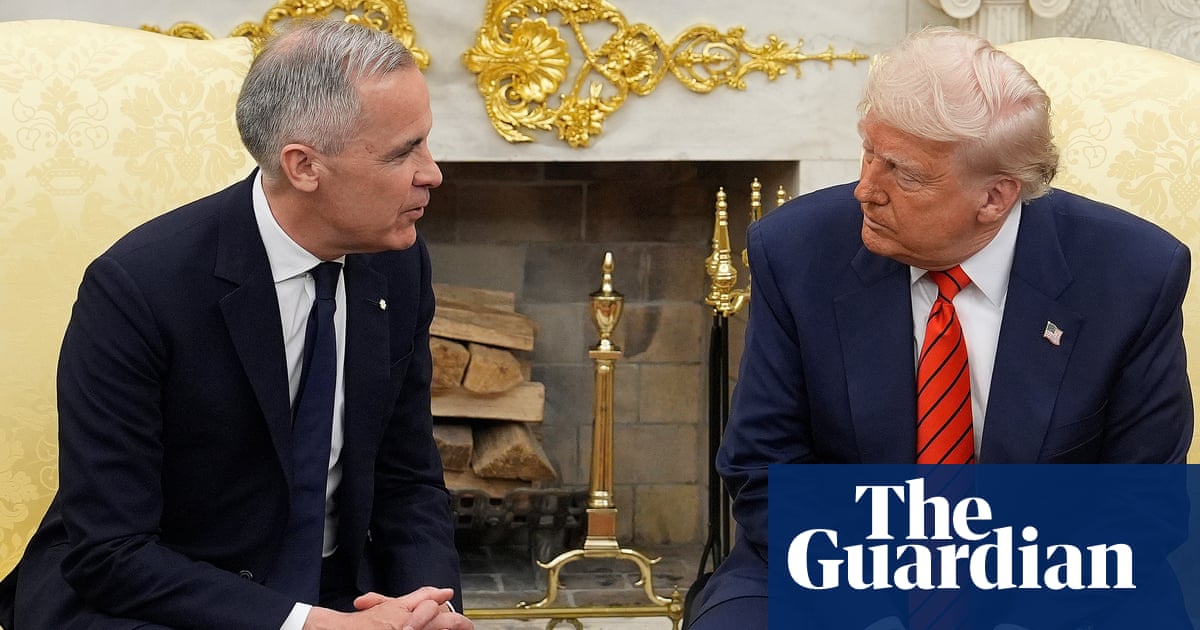Donald Trumphas said he “just want[s] to be friends withCanada” after his first post-election meeting with the country’s prime minister,Mark Carney– who used the gathering to shoot down any prospect of his country becoming the 51st state.
Speaking in the Oval Office, Trump praised Carney – whose Liberal party won the federal election last week – for one of the “greatest political comebacks of all time,” and described the prime minister’s visit as “an honour” for the White House.
The amicable tone of Tuesday’s meeting marked a stark contrast with Trump’s hostile rhetoric over recent months, as he launched a trade war against his northern neighbour, belittled Carney’s predecessorJustin Trudeauand made repeated threats to crush Canada’s economy with the aim of annexing it.
Carney returned the praise, telling Trump he was a “transformational president” with a strong focus on the economy. But he shot down any idea thatCanadamight accede to joining the US as the 51st state – a proposal again floated by Trump in the meeting.
“As you know from real estate, there are some places that are never for sale,” Carney told Trump.
“That’s true,” said Trump.
“Having met with the owners of Canada over the course of the campaign … it’s not for sale,” said Carney. “Won’t be for sale, ever.”
The meeting between the prime minister and president is likelythe most closely watched summit in Canada’s history, amid fears of further diplomatic and trading friction between two countries which have traditionally shared political and cultural values.
Minutes before the meeting, Trump posted on social media that he “very much” wants to work with Carney, but revived a debunked figure that the US is “subsidizing Canada by $200 Billion Dollars a year, in addition to giving them FREE Military Protection”.
“We don’t need their Cars, we don’t need their Energy, we don’t need their Lumber, we don’t need ANYTHING they have, other than their friendship, which hopefully we will always maintain,” he wrote. “They, on the other hand, need EVERYTHING from us! The Prime Minister will be arriving shortly and that will be, most likely, my only question of consequence.”
Carney crafted much of his successful federal election campaign around a patriotic defiance to the US president’s threats to the nation’s sovereignty. The prime minister has repeatedly accused Trump of trying to “break” Canada so that he can “own” the country. Carney also used his first post-election press conference to once again quash any idea Canada was interested in becoming the 51st US state, a proposal repeatedly floated by Trump.
“It’s always important to distinguish want from reality,” Carney said last week. But Carney has throughout steered clear of criticizing the president personally, acutely aware the two nations also share a tightly integrated economy, with more than C$1tn in trade – and that US diplomacy depends more than ever on the whims of its president.
The country’s trade relationship came up during the meeting, with Trump signalling he was interested in renegotiating key aspects of USMCA free trade agreement, calling the prior deal, Nafta, the “worst in the history of the world”.
“We’re dealing more with concepts right now,” Trump said later in the meeting, telling reporters he didn’t want Canadian cars or steel. “We want to do it ourselves.”
Asked if there is anything Carney can say to him that would make him lift the tariffs on Canada, Trump replied: “No.”
Carney pushed back on Trump’s characterization of the current deal, including the use of tariffs by US officials, but agreed the existing deal was a “framework” for future talks and a “bigger discussion”.
Sign up toThis Week in Trumpland
A deep dive into the policies, controversies and oddities surrounding the Trump administration
after newsletter promotion
Travelling with Carney were some of the country’s top trade and diplomatic officials, including international trade minister Dominic LeBlanc, foreign affairs minister Mélanie Joly, public safety minister David McGuinty and Canada’s ambassador to the US, Kirsten Hillman.
Seated alongside Trump were his vice-president, JD Vance; the US secretary of state, Marco Rubio; the US secretary of commerce, Howard Lutnick; and US trade representative Jamieson Greer.
Trump, who at times used the meeting to attack the former US president Joe Biden, also used the forum to criticize Trudeau and former finance minister Chrystia Freeland.
“She was terrible. Actually, she was a terrible person, and she really hurt that deal very badly because she tried to take advantage of the deal and she didn’t get away with it,” said Trump.
Before Carney and Trump met at the White House, Canadian provincial leaders weighed in.
“This guy drives me nuts,” Ontario’s premier, Doug Ford, said of Trump. “You see this guy on TV, ‘We don’t need Canada.’ Really?” he said, telling attendees that Canada’s largest trading partner desparately needs potash, nickel and uranium.
Ford, a populist conservative who has embraced his role as a patriotic anti-Trump figure, said a growing number of US governors “totally disagree” with the president’s trade war with its northern neighbour.
Ford pointed to fresh polling that shows a drop in Trump’s approval rating as the cost of tariffs hit American consumers.
“I can’t wait for the midterms. Then we’ll fix his little red wagon,” he said.
